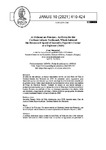Mostrar o rexistro simple do ítem
Al Tribunal de Príncipes. An Essay for the Cardinal-Infante Ferdinand, Which Initiated the Downward Spiral of Saavedra Fajardo's Career as a Diplomat (1640)
| dc.contributor.author | Monostori, Tibor | |
| dc.date.accessioned | 2021-11-02T13:21:57Z | |
| dc.date.available | 2021-11-02T13:21:57Z | |
| dc.date.issued | 2021-06-24 | |
| dc.identifier.citation | Monostori, T. (2021). “Al Tribunal de Príncipes”. An Essay for the Cardinal-Infante Ferdinand, Which Initiated the Downward Spiral of Saavedra Fajardo's Career as a Diplomat (1640). Janus: estudios sobre el Siglo de Oro, 10, 410-424. URL: https://www.janusdigital.es/articulo.htm?id=185. DOI: https://doi.org/10.51472/JESO20211021 | es_ES |
| dc.identifier.issn | 2254-7290 | |
| dc.identifier.uri | http://hdl.handle.net/2183/28780 | |
| dc.description.abstract | [Resumen] Se edita en este artículo un ensayo diplomático escrito por don Pedro de Villa al Cardenal-Infante don Fernando en 1640. Se presentan varios argumentos para demostrar que fue este discurso que inició una larga lista de decisiones tomadas por el gobierno de los Países Bajos españoles que terminaron con la carrera diplomática de Diego de Saavedra Fajardo. Además, el ensayo es una fuente ejemplar y excepcional para mostrar que la percepción sobre la Monarquía Católica en el Sacro Imperio Romano era múltiple: si bien los enemigos superaban a los aliados, había una detallada y larga lista de príncipes y líderes políticos que apoyaban firmemente o condicionalmente Madrid incluso a finales de 1640. | es_ES |
| dc.description.abstract | [Abstract] A political-diplomatic essay written by don Pedro de Villa and sent to the cardinal-infante Ferdinand in 1640 is edited here. A number of arguments are presented to prove this discourse spurred the government of the Spanish Netherlands to take a long series of actions that lead to the ruin of Saavedra Fajardo’s diplomatic career. In addition, the essay is an exemplary and exceptional source showing that the perceptions of the Spanish Monarchy in the Holy Roman Empire were varied. The enemies outweighed the allies, but there was a long and detailed list of princes and political leaders who were strongly or conditionally supportive, even at the end of 1640. | es_ES |
| dc.description.sponsorship | The research is part of the Project PGC2018-096593-B-I00: Contextos y posteridad de la obra de Diego de Saavedra Fajardo. Revolución científica y estética literaria (1600-1750). | es_ES |
| dc.language.iso | eng | es_ES |
| dc.publisher | Universidade da Coruña | es_ES |
| dc.relation | info:eu-repo/grantAgreement/AEI/Plan Estatal de Investigación Científica y Técnica y de Innovación 2017-2020/PGC2018-096593-B-I00/ES/CONTEXTOS Y POSTERIDAD DE LA OBRA DE DIEGO DE SAAVEDRA FAJARDO: ESTETICA LITERARIA Y REVOLUCION CIENTIFICA (1600-1750) (II) | es_ES |
| dc.relation.uri | https://doi.org/10.51472/JESO20211021 | es_ES |
| dc.rights | Atribución-NoComercial-SinDerivadas 4.0 Internacional | es_ES |
| dc.rights.uri | http://creativecommons.org/licenses/by-nc-nd/4.0/ | * |
| dc.subject | Saavedra Fajardo | es_ES |
| dc.subject | Pedro de Villa | es_ES |
| dc.subject | Diplomacia | es_ES |
| dc.subject | Siglo XVII | es_ES |
| dc.subject | Leyenda negra | es_ES |
| dc.subject | Casa de Austria | es_ES |
| dc.subject | Países Bajos españoles | es_ES |
| dc.subject | Cardenal-Infante don Fernando | es_ES |
| dc.subject | Diplomacy | es_ES |
| dc.subject | 17th century | es_ES |
| dc.subject | Black Legend | es_ES |
| dc.subject | House of Habsburg | es_ES |
| dc.subject | Spanish Netherlands | es_ES |
| dc.subject | Cardinal-Infante Ferdinand | es_ES |
| dc.title | Al Tribunal de Príncipes. An Essay for the Cardinal-Infante Ferdinand, Which Initiated the Downward Spiral of Saavedra Fajardo's Career as a Diplomat (1640) | es_ES |
| dc.title.alternative | Al Tribunal de Príncipes. Un ensayo escrito al Cardenal-Infante don Fernando, que inició la espiral descendente de la carrera diplomática de Saavedra Fajardo (1640) | es_ES |
| dc.type | info:eu-repo/semantics/article | es_ES |
| dc.rights.access | info:eu-repo/semantics/openAccess | es_ES |
| UDC.journalTitle | Janus: estudios sobre el Siglo de Oro | es_ES |
| UDC.volume | 10 | es_ES |
| UDC.startPage | 410 | es_ES |
| UDC.endPage | 424 | es_ES |
| dc.identifier.doi | 10.51472/JESO20211021 |






